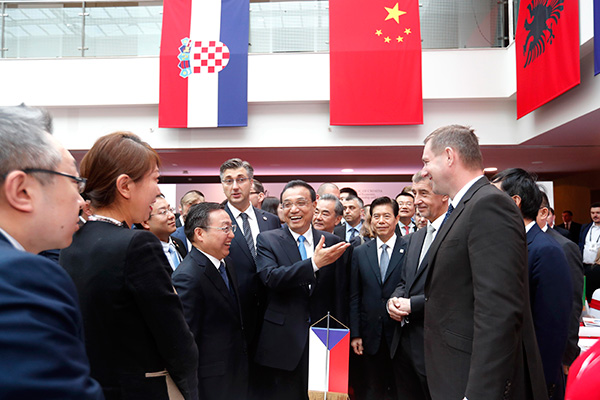
Premier Li Keqiang attends a matchmaking fair for small and medium-sized enterprises in China and Central and Eastern European countries on April 12 in Dubrovnik, Croatia. Business representatives from more than 150 companies participated in the fair.[Photo/China Daily]
Bank of China held a matchmaking fair for small and medium-sized enterprises in China and Central and Eastern European countries during the eighth leaders’ meeting between China and Central and Eastern European countries in Dubrovnik, Croatia.
The fair on April 12, jointly organized by the bank and Croatia’s Chamber of Economy and Ministry of Economy, Entrepreneurship and Crafts, attracted SME delegates from China and 16 Central and Eastern European countries. The delegates came mostly from industries such as information technology and telecommunications, culture, tourism and education.
Premier Li Keqiang and CEEC leaders attended the fair, accompanied by Bank of China Chairman Chen Siqing.
The fair’s organizers held 121 one-on-one meetings, some of them online, between Chinese and CEEC enterprises to promote SME cooperation on both sides and promote trade and investment.
In recent years, the volume of trade and investment between China and the CEEC has grown continuously. By holding cross-border matchmaking fairs, Bank of China works to match the needs of the enterprises and stimulate Chinese and CEEC economic and trade cooperation.
Since 2014, Bank of China, the nation’s fourth-largest commercial lender by assets, has held 52 cross-border matchmaking fairs worldwide involving 30,000 SMEs from 87 countries and regions in an effort to build an interconnected global SME network. Many of the enterprises come from countries and regions associated with the Belt and Road Initiative.
The bank provides financial services to qualified companies to help them develop cross-border investment and trade, in addition to supporting SMEs to innovate in technologies, products and models of management and business.
“Bank of China’s cross-border matchmaking service is widely acclaimed because it can help Chinese companies find the potential overseas partners they need most. It reduces the cost of communication for these companies and improves communication efficiency,” said Zhu Jun, general manager of the bank’s inclusive finance department.
Zeng Gang, deputy director-general of the Chinese Academy of Social Sciences’ National Institution for Finance and Development, said, “Commercial banks have accumulated vast resources in the upstream and downstream supply chain. By integrating resources to support the development of SMEs, banks will not only find new business opportunities but also lower lending risks.”
Bank of China has a vast domestic and overseas layout of branches and a wide payment and settlement network. With its resources, it can help SMEs find growth opportunities and provide financing and settlement services, Zeng said.
Meanwhile, the bank has explored various measures to help domestic SMEs overcome financing difficulties, such as by making equity investments in small and medium-sized technology companies.
It has also optimized the credit approval procedure for technology companies, providing financing on the basis of ownership of intellectual property rights. By the end of last year, the bank had adopted this model in eight cities, including Beijing and Shanghai, serving a total of 46,700 technology SMEs and offering 56.76 billion yuan ($8.47 billion) in loans.
